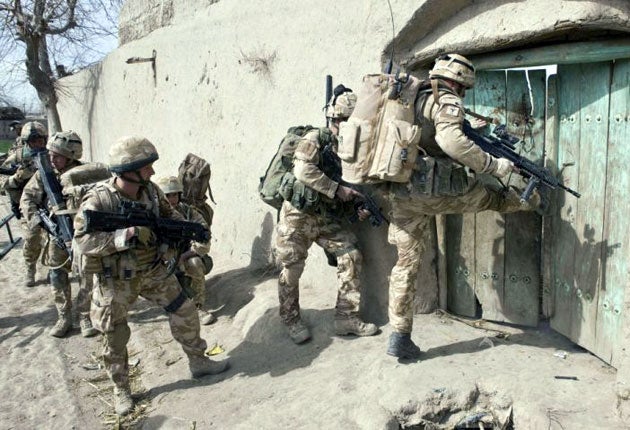Troops seize £50m of Afghan opium
Operation involving 700 British and Afghan soldiers delivers blow to drug trade that funds the Taliban

The roar came through the night as a phalanx of helicopters, silhouetted against the sky, flew in to land in Helmand’s Upper Sangin Valley amid the flash of Taliban fire from the surrounding hills.
This was the start of Operation Diesel involving more than 700 British and Afghan troops, including the SAS, in a mission to hunt down the vast stores of narcotics which are being used to fund the Afghan insurgency.
By the time it ended, after five days of rolling combat, opium worth more than £50m had been found hidden behind high walls of |purpose-built factories and storehouses. It was one of the biggest single finds of drugs caches. The operation also highlighted the new role for British troops since Nato’s controversial decision to extend its remit to embrace counter-narcotics. It was a move opposed by many commanders concerned about creating another enemy – disgruntled poppy farmers.
However, with Afghanistan providing 92 per cent of the world’s heroin supply, and a sizeable portion of the revenue going to the Taliban, the US have been insistent that the drug trade should be directly targeted. General John Craddock, the American commander of Nato forces in Europe, has declared that troops in Afghanistan can open fire on traffickers without the need for direct evidence.
Helmand, which produces 44 per cent of the national crop, is likely to see similar missions in the future. Sangin is one of the most violent parts of the province and has become a conduit for Taliban fighters and weapons coming from across the Pakistani border, with drugs going in the other direction. What was discovered during the raid in the Sapwan Qala area showed the scale of the opium cottage industry: 1,295kg of wet |opium and the equipment needed to turn it into street-level heroin including 5,000kg of ammonium chloride, 1,025 litres of acetic anhydride, 1,000kg of salt and 300kg of calcium hydroxide. Then there was the evidence of the intrinsic link between the trade and violence – Kalashnikov assault rifles, PKM heavy-calibre machine guns, rocket- propelled grenade launchers, thousands of rounds of ammunition and motorbikes modified for carrying out suicide attacks.
One of biggest drugs caches was being guarded by attack dogs. A marine said: “One of them was a massive guard dog which has had its ears and tail cut off. We were extremely wary because, at the same time, we were looking out for mines and IEDs (improvised explosive devices)”.
As the troops moved through the villages they came across former family homes converted to process opium. There were huge vats, presses and chemicals as well as piles of burlap sacks to pack the heroin.
“In one compound we found 10 to 15 barrels of wet opium cooking away,” said Marine Jake McEndoo, of 45 Commando. “It was the most I have ever seen.”
Meanwhile, Taliban fighters, dodging in and out of the warren of alleyways, maintained a steady stream of Kalashnikov and RPG fire. Captain Olly Osborne, of 45 Commado, said they were clearing a compound when an RPG buzzed over their heads. He said: “It was fired by a guy who came out of an alleyway. Our guys opened up on him in response”. The team then came under fire from a heavy machine gun until it was silenced by cannon fire from an Apache helicopter gunship.
Brigadier Gordon Messenger, commander of British troops in Helmand, said: “The links between the Taliban and the drugs trade are well proven and we know that the revenue from narcotics production directly funds the insurgency. This was a clinical, precise strike, supported by strong intelligence, which has had a powerfully disruptive effect on known insurgent and |narcotics networks in the area.”
The Defence Secretary, John Hutton, said: “Our dedicated and professional forces have once again taken the fight to the enemy. The seizure of £50m worth of narcotics will starve the Taliban of crucial funding and prevent the proliferation of drugs and terror on the UK’s streets.”
Join our commenting forum
Join thought-provoking conversations, follow other Independent readers and see their replies
Comments
Bookmark popover
Removed from bookmarks